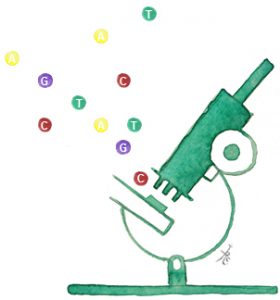President Obama announced details about the Precision Medicine Initiative in his State of the Union Address in January 2015. The initiative focuses on individual variability in genes, environment and lifestyle as avenues for disease treatments. It provides tools to understand complex mechanisms that underlie conditions and to predict effective treatments. The process requires the gathering and sorting of massive amounts of patient data into databases that can then be used to help inform disease research.
But how are these large data sets generated and managed?
 Anita Umesh is the lead biomedical data scientist at Illumina, where her responsibilities include pulling together data from a variety of clinical and patient sources and organizing them in a way that can be used by other medical professionals. Her work will allow for more efficient ways to collect and make sense of patient information, and also aligns well with the goals of the Precision Medicine Initiative to use individual patient factors to inform new avenues of basic research.
Anita Umesh is the lead biomedical data scientist at Illumina, where her responsibilities include pulling together data from a variety of clinical and patient sources and organizing them in a way that can be used by other medical professionals. Her work will allow for more efficient ways to collect and make sense of patient information, and also aligns well with the goals of the Precision Medicine Initiative to use individual patient factors to inform new avenues of basic research.
During her postdoctoral training at Johns Hopkins, Umesh used cell physiology and molecular biology techniques to test rat models of pulmonary arterial hypertension. She talks positively about the research environment, including the scientific expertise and interactions of the lab members. She then moved to Stanford, working as a staff scientist in pulmonary arterial hypertension, but this time in pediatric models, which she describes as having been a smooth transition.
But Umesh decided to transition away from the wet lab, landing in her current computer-heavy career working with large biomedical data sets. Her advice for transitioning into a new area of work is to ask questions, be resourceful in finding answers, question your own quality of work and test your work from multiple angles.
Though Umesh is a self-declared introvert, her biggest piece of advice for finding career opportunities is “to put yourself out there and network.” Even if taking her own advice has forced her out of her comfort zone on many occasions, it has helped her secure numerous connections that have benefited her career transitions. Umesh is currently a member of several organizations, including the Healthcare Business Women’s Association. These types of encounters have led to several important job-related conversations.
“It is far easier nowadays than it was when I was at Hopkins,” she says of the avenues available to facilitate networking opportunities, including social media and networking events. There are several local networking opportunities for various disciplines and interests. If you’d also like to be at the intersection of business and health care, consider events held by the Healthcare Business Association at Johns Hopkins.
For a more general resource of career-related events, take a look at the calendar of events listed by the Biomedical Careers Initiative.
Related Content
- Watch: #TomorrowsDiscoveries: Data and Medical Care – Dr. Christian Jone
- Mining Big Data to Help Patients
- Video: Biomedical Careers Initiative Internship with BioHealth Innovation
Tao Yu, a graduate student in the Department of Biomedical Engineering, talks about his internship with BioHealth Innovation. Watch to learn more. - Video: Biomedical Careers Initiative Internship with ASBMB
Dr. Maggie Kuo talks about her internship with the American Society for Biochemistry and Molecular Biology (ASBMB). Watch to learn more. - Video: Biomedical Careers Initiative Internship with Medimmune, LLC
Amy Anderson, a PhD candidate with the Cellular and Molecular Medicine (CMM) graduate program, talks about her internship with MedImmune, LLC. Watch to learn more.